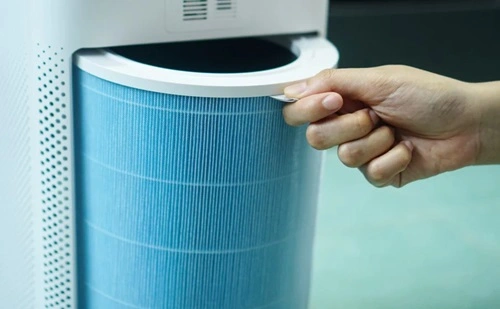Have you ever questioned whether air filters can genuinely stop viruses? Well, you are not alone! As the awareness about indoor air quality and health increases, many people are curious about how effective air filters and purifiers are in combating airborne viruses. While these devices are commonly used to improve air quality, their role in virus prevention is often misunderstood.
Modern air filters have advanced technologies designed to tackle various pollutants, but their ability to filter out and neutralise viruses is a question that continues to spark debate. From HEPA filters to UV-C light technology, understanding how these components work can shed light on their effectiveness. Let’s explore how air filters function and whether investing in an air purifier machine is a smart move for your health.

Understanding Air Filters and Their Function
Air filters trap particles and pollutants in the air, including dust, pollen, and pet dander. These air purifier machines come in various types, including HEPA or High-Efficiency Particulate Air filters, activated carbon filters, and UV-C light filters. Each of these purifiers serves a unique purpose.
- HEPA Filters: These filters are known for their ability to capture very small particles, including those as tiny as 0.3 microns. This makes these filters highly effective in removing allergens and fine dust from the air.
- Activated Carbon Filters: These filters are adept at removing odours and gases through adsorption. They are often used in combination with HEPA filters for comprehensive air purification.
- UV-C Light Filters: UV-C filters use ultraviolet light to kill microorganisms like bacteria and viruses. They are an additional feature in some air purifiers aimed at enhancing the device’s ability to sanitise the air.
The Role of Air Purifier Machines in Virus Prevention
Air purifiers have become essential household appliances, especially as the concerns about indoor air quality and health grow. When it comes to defending against airborne viruses, these devices offer more than just a breath of fresh air. Modern air purifiers, particularly those equipped with a combination of HEPA filters and UV-C light, provide an enhanced layer of protection.
- Effective Particle Capture: By capturing particulate matter and viruses with HEPA filters and then neutralising any remaining pathogens with UV-C light, these air purifiers provide a thorough cleaning process. This dual-action approach ensures that both physical and biological contaminants are addressed, leading to cleaner, safer air.
- Increased Efficiency: Air purifiers equipped with these technologies are particularly beneficial in environments where air quality is a concern, such as homes with allergies or respiratory conditions. Reducing the viral load in the air can contribute to a healthier living space and potentially lower the risk of illness.
- Real-Time Monitoring and Alerts: Some modern air purifiers come with sensors and real-time monitoring capabilities, alerting users when air quality drops or when filters need to be changed. This helps ensure that the cleaner is always functioning optimally.
- Improved Respiratory Health: By filtering out harmful particles and microorganisms, air purifiers can help alleviate symptoms for individuals with respiratory conditions such as asthma or allergies, making the air easier to breathe.
Beyond Air Filters: Additional Measures for Virus Prevention
While air purifiers can improve indoor air quality and support a healthier environment, they should not be your only line of defence against viral infections. Complementary practices are essential for comprehensive protection.
- Ventilation: Regularly ventilating indoor spaces helps to reduce the concentration of airborne contaminants and improves air quality. Opening windows and using exhaust fans can enhance the effectiveness of air purifiers.
- Hygiene Practices: Maintaining hygiene practices, such as regular hand washing and disinfecting surfaces, is crucial in preventing the spread of viruses. Air purifiers are a supportive measure but should be used alongside these practices for optimal protection.
- Health Monitoring: Staying informed about local air quality and health recommendations can help you make informed decisions about using air purifiers and other protective measures.
Choose the Best Air Purifiers: Your Ally Against Viruses
An air purifier excels at improving air quality and reducing the risk of airborne viruses. With its combination of HEPA filtration and UV-C light technology, an advanced air purifier can tackle various contaminants, ensuring that your indoor environment is as safe and clean as possible.
This dual functionality makes it essential for any home focused on both air purity and effective virus prevention. For those looking for superior air purification, consider brands like Dyson for a better range of air purifiers. These brands adopt an innovative approach to air filtration and purification, ensuring that you can breathe easier and live healthier!
Anantha Nageswaran is the chief editor and writer at TheBusinessBlaze.com. He specialises in business, finance, insurance, loan investment topics. With a strong background in business-finance and a passion for demystifying complex concepts, Anantha brings a unique perspective to his writing.


